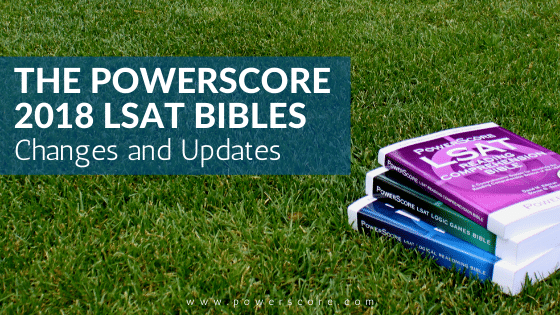Each year I make revisions and updates to the LSAT Bibles, and there are several different reasons for that. First, at least three new LSATs are released each year, and I like to make changes to some of the content to account for new directions taken by the test makers. Second, I talk with many different LSAT students and also teach various sessions throughout the year, and the feedback I receive helps me shape and improve parts of each book. And, finally, as I discussed last year, the books have changed so much over time that providing new versions each year helps students know they are getting the most up-to-date versions possible.
Because of this, one of the most common questions we receive is: what has changed, and do I need to get the newest editions? So that’s what I’ll be talking about in this post.
Next, let’s discuss the changes book by book, starting with the one I worked on first:
Reading Comprehension Bible
The 2018 version of the RCB is 23 pages longer than the 2017 version.
In the past several years, this book has grown quite a bit. I have been remaking the focus of the RCB slowly but surely, in order to create a more fluid approach to reading each passage, and also to provide a broader set of tools for breaking down text and decoding meaning. I’ve also added extensive new sections that help diagnose and eliminate problematic areas you might have in RC.
All of these changes have been done on top of prior revisions that changed our approach to passage diagramming and Comparative Reading question types, as well as other previous changes. The newest version represents what I consider to be a solid improvement on all prior editions of this book.
Logic Games Bible
The 2018 version of the LGB is 24 pages longer than the 2017 edition.
The additions came from new discussions of key concepts, including how rules operate inside games, and when and why you need to track certain rule types. Plus, I expanded multiple drill sets in the book by adding new items. I did this in response to student requests for additional problems in the LGB, and these new items give readers more opportunities to work with the techniques and see the concepts in action.
Given the major changes to the LGB in 2016 (which invalidated all prior versions), only the 2017 and 2018 versions should be used, with 2018 being the superior version of the two.

